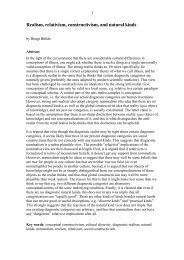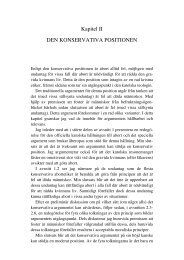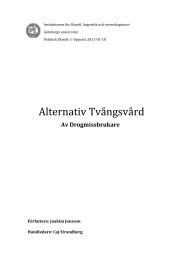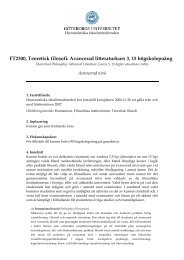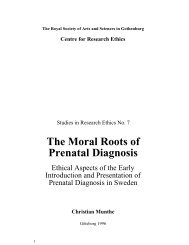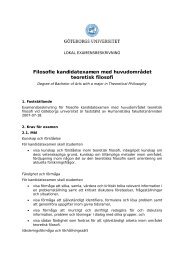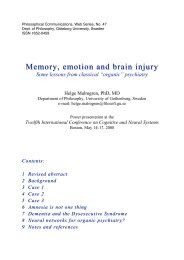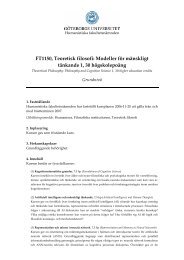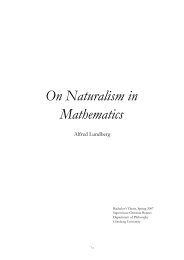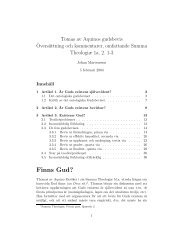2areas. I shall be concerned with finding the right amount, and the right kind, ofobjectivity for moral judgements within the framework. Thus the ultimate aim of thepaper is to sketch an account of judgement which (a) allows an answer to the question“Are moral judgements objective, and if so to what extent?” and (b) explains why moraljudgements in particular present an especially difficult and controversial case. I shall startby summarising my approach to the general problem, then I shall develop and refine thatapproach and apply it to moral judgements.The general problem of non-objectivityI shall start by outlining my view about the general problem of objectivity by consideringcases that are much easier and clearer than the case of moral judgement. Consider(1) Chewing tobacco is rich in vitamins.(2) Chewing tobacco is enjoyable.In important respects, (1) and (2) are similar: they have the same grammatical and logicalform. They both express propositions that can be called “true”. There are certainstandards of correctness for both: one could err in believing the propositions they express.Both have negations, and their negations are incompatible with them. However, manypeople, including myself, differentiate between (1) and (2) in terms of the objectivity oftheir subject matter: (2) does not concern an objective matter while (1) does. (The reasonsfor saying that evaluative propositions lack objectivity are ultimately epistemological: ifwe are to say that there are objective facts of the matter, to which our judgements onthese matters are answerable, then we also need some account of how thinkers can accessthese very facts independently of one another.)I follow Crispin Wright (1992) in thinking that objectivity or lack thereof isindependent of truth-aptness. A proposition can be truth-apt yet lack objectivity. But whatis objectivity if not aptitude for truth? According to the definition I shall be using, aproposition is objective just if we know in an a priori manner that if there is adisagreement on that proposition then at least one party is mistaken. Conversely, aproposition is not objective if a disagreement on it, for all we know, may not involve anymistake. Let’s consider the example again. The idea is that a disagreement on (1)conclusively shows that one of the parties has made a mistake, while a disagreement on(2) does not. In other words, if you think chewing tobacco is rich in vitamins and I thinkit’s not, then one of us is wrong, and we know this in an a priori manner (more on thislater). By contrast, if you think chewing tobacco is delicious and I think it’s not, then thatalone does not show that one of us is wrong. The matter is less clear for moralpropositions, like the one expressed by:(3) It is morally wrong to use chewing tobacco.Here it is controversial whether (3) should be grouped with (1) or with (2) when it comesto objectivity. It is the uultimate aim of this paper to describe the kind of objectivityexhibited by judgements like the one expressed by (3) compared to those expressed by(1) and (2). But before I get to that, I will need to do a lot of stagesetting.
3Mainstream theories of logic and language are quite hostile to the possibility of nonobjectivityin the above-defined sense of a possibility of faultless disagreement. I haveargued elsewhere (2002, 2003) that the best way of making room for it is to relativise thetruth of propositions (at least truth as it is relevant to semantics and logic) to something Icalled “perspectives”. This relativisation goes beyond the relativisation involved inpossible world semantics, the main difference being that in the scheme I propose there isno analogue of the actual world, i.e. no uniquely privileged perspective. In thebackground of the semantics of relative truth is a wider conception of the relationshipbetween thought, language and the world, which offers an explanation of why somepropositions are objective others are not. In the next two sections I shall outline this widerconception.Conceptual rules and a priori knowledgeThe general conception in the background starts from the assumption that both thoughtand speech are social institutions. We frame thought in terms of public concepts, whichare governed by social norms. It is crucial that there are these social norms, to whichusers of public concepts subject themselves, because this makes it possible for people topool their cognitive resources. Because you and I both employ a common public conceptof a traffic jam, and because there is a language we both know in which one can expressthe concept of a traffic jam, I can tell you that there is a traffic jam on the M25 and youcan take advantage from receiving this information. There may well be exceptionaloccurrences of idiosyncratic thought, i.e. thought that is not framed in terms of publicconcepts, and perhaps conceptual progress and novelty depends on it. However, in largepart thought can be viewed as a social phenomenon. 1All the possible judgements within the repertoire of a competent thinker are subjectto a number of norms. Any judgement is potentially correct or incorrect, because theactivity of making judgements is constitutively governed by these norms. The process ofbecoming a competent thinker is the process of getting to know, and subjecting oneselfto, these constitutive norms. In large part (but only in large part), this happens inchildhood: an already competent thinker teaches a not-yet competent, or partiallycompetent, learner. Teachers teach by example as well as by explicit instruction andexplanation. Of course the only way in which teaching can take place is through themedium of a language: the process of learning how to judge and learning how to use alanguage are intimately interdependent and largely identical. For example, learning whatthe word “sleep” means will often coincide with learning the concept of sleep, its rules ofapplication. 2 Knowing these constitutive norms of a concept will enable one to employ1 This general approach is compatible with more individualistic conceptions of thought and language: it ispossible to describe the same thinker in two different ways: as a thinker with his own unique system ofthought and with his own unique idiolect, or as a thinker whose individual thought-processes participate ina communal system of thought and a communal language. However the approach that stresses the socialaspects of thought might make it easier to explain certain social phenomena of thought and communication.In the current context this will be an advantage.2 Of course it is not impossible to master a concept without mastering any word that expresses that concept,but if the concept is a public one, then mastering it will typically involve learning to express it in a publiclanguage.



